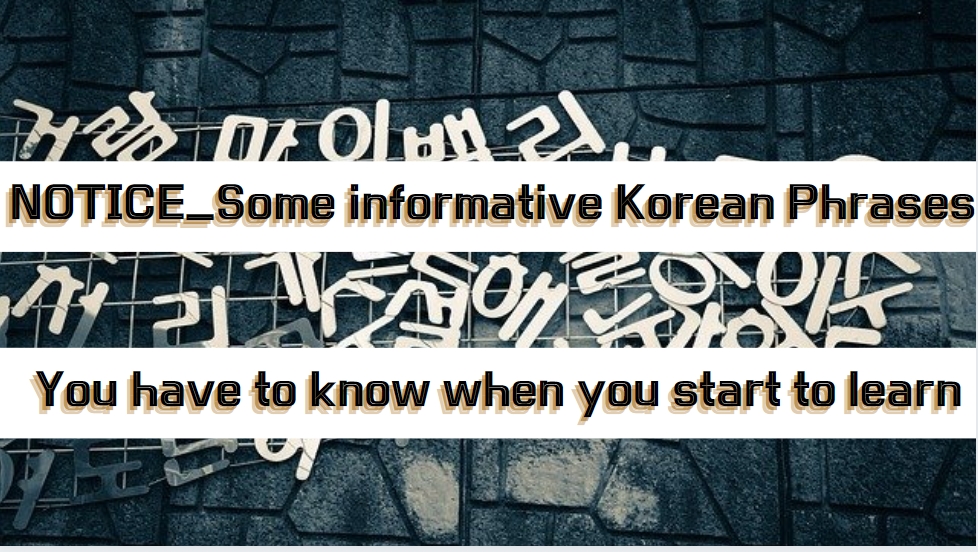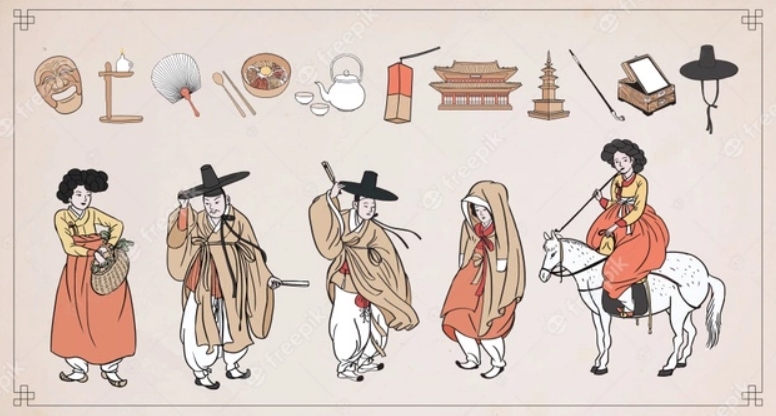30 Useful Korean Phrases you need to know

안녕하세요 (ahn-nyung-ha-se-yo) — Hello
This can be said at any point in the day, and you can reply to this in exactly the same manner.
반갑습니다 (bahn-gap-seup-ni-da) — Nice to meet you
If you meet someone, especially someone of importance, you can illustrate your respect with this short phrase.
어떻게 지내세요? (uh-dduh-keh ji-neh-seh-yo?) — How are you?
Just a standard way to inquire about someone’s day. It can be used with those you’ve seen recently or those you haven’t seen in a while.
잘 지내요 (jal-ji-neh-yo) — I am good
A positive response to the above question of “How are you?” and can simply mean that all’s well in your world.
제 이름은 _____ (jeh ee-reum-un _____) — My name is _____
A simple way to introduce yourself to anyone.
안녕 (ahn-nyung) / 안녕히 계세요 (ahn-nyung-hee geh-seh-yo) / 안녕히 가세요 (ahn-nyung-hee gah-seh-yo) — Goodbye
“Goodbye” comes in different flavors in Korean. 안녕 is informal and should be used for friends and closer acquaintances. 안녕히 계세요 (lit. “Please stay well”) is specifically for when you are leaving the premises, but the other person is staying. Conversely, 안녕히 가세요 (Please leave well) is when you are staying, but the other person is leaving.

감사합니다 (gam-sa-ham-ni-da) — Thank you
This is a formal, all-around safe way to offer your gratitude. Alternatively, you may say 고맙습니다 (go-mahp-seup-ni-da).
천만에요 (chun-mahn-eh-yo) — You’re welcome (formal)
It’s not often that Koreans actually respond to a “Thank you” with a “You’re welcome,” but if you wish to be extra polite, then you can throw in this phrase. Normally, you can respond to thanks with a simple, humble 아닙니다 (ah-nib-nee-da), which means “It’s nothing.”
실례합니다 (shil-leh-hap-nee-da ; polite) / 잠시만요 (jam-shi-mahn-yo ; “wait a moment”) — Excuse me
실례합니다 is a very polite phrase used to get someone’s attention, such as for when you approach a stranger for help. 잠시만요 more or less means “Wait a moment” but can be used for situations such as when you need to push past or be a minor physical hindrance to people.
여기요 (yuh-gi-yo) — Over here
Use this phrase with a raised hand or some kind of physical gesture to get someone to come over to you. This can also be used to flag down a waiter in a restaurant.
죄송합니다 (jweh-sung-hap-nee-da) / 미안합니다 (mi-ahn-hap-nee-da) — I’m sorry
Used for any situation where you need to excuse your behavior. Both ways of saying sorry are formal and have an almost equal amount of weight (are interchangeable).
주세요 (ju-seh-yo) — Please give

Use this if you’re politely requesting an object from another person. This can be said alone, or follow after you specify what you want. For example, “Jeans 주세요.”
왼쪽 (oen-jjok) / 오른쪽 (oh-reun-jjok) / 직진 (jik-jjin) — left / right / straight
These are self-explanatory, and if you’re asking for directions, you’ll most definitely be hearing these words. Make sure you memorize them so you can at least pick up general directions.
길을 잃었어요 (gil-eul ilh-uht-suh-yo) — I’m lost
The phrase literally means “I lost my way” and will tell any native that you’ll need some navigation help. Follow up with something that will indicate where you’d like to go.
_____ 어디인지 아세요? (_____ uh-di-eehn-ji ah-seh-yo?) — Do you know where _____ is?
This will be critical anytime you need to locate anything. This phrase isn’t travel-specific, and can be used for most situations where you need to find a location (for example, you can use this phrase at a department store to find a specific shop).
잘 모르겠네요 (jal mo-reu-geht-neh-yo) — I don’t understand
It’s highly likely that you won’t understand every word of Korean you hear, and it’s best to let whoever’s talking to you know that! Many will be kind enough to try and simplify their message for your comprehension.
한국말 잘 못해요 (hahn-guhk-mal jal moht-heh-yo) — I don’t speak Korean well
A nice notification that will save you from being bombarded by Korean. Honesty is a good policy when it comes to using a foreign language.
영어 할 수 있어요? (yung-uh hal su-eet-suh-yo?) — Do you speak English?
Most Korean natives know some English to be able to help you out in a tough spot, so don’t be afraid to ask!
천천히 말씀해 주세요 (chun-chun-hee mal-sseum-heh ju-seh-yo) — Please speak slowly
Korean is a rather quickly-spoken language, especially when the speaker is quite emotional (Korean dramas, anyone?). Therefore, use this phrase to politely request a slow-down.
_____ (으)로 가주세요 (ih-roh gah-ju-seh-yo) — Please take me to _____
If you need a guiding hand, then this will be the phrase to use. You can quickly find people willing to direct you to where you need to go. This phrase can also be used to inform a taxi driver of your destination. (When the place name ends with a consonant, use “으로,” otherwise use “로.”)
화장실이 어디예요? (hwa-jang-shil-ee uh-di-eh-yo?) — Where is the bathroom?
Because in the world of travel, being able to find a bathroom is essential. Note that 어디예요, by itself, means “where is it.”

_____ 주세요 (_____ ju-seh-yo) — Please give me _____
To order your meal, simply state it and tack on 주세요 afterwards. Short and simple!
메뉴 주세요 (meh-nyu ju-seh-yo) — Menu, please
More often than not, Korean restaurants won’t have the menu out on the tables. To get one, simply raise your hand and state this phrase.
계산서 주세요 (keh-san-suh ju-seh-yo) — Bill, please
Waiters in Korean restaurants often will not personally ask if you’ve finished your meal, so once your stomach is satisfied and you’re ready to head out, ask for the bill!
싸 주세요 (ssa ju-seh-yo) — Please wrap / It’s to-go
If you want wrapped leftovers, you definitely have to let your servers know as they probably will assume otherwise. Note that you’ll likely only get your meal, not any side dishes, packed up.
저 알러지 있어요 (juh ahl-luh-ji eet-suh-yo) — I have an allergy

화이팅! or 파이팅! (hwa-ee-ting! or pa-ee-ting!) — Fighting!
Slang used for encouragement, you can passionately exclaim this to boost one’s morale. It’s usually accompanied with a firm shake of the fist.
괜찮아요 (gwaen-chanh-ah-yo) — It’s okay
The equivalent to the English “It’s fine.” You can say this in a multitude of situations, such as expressing the state of your physical health or accepting a certain circumstance.
진짜요? (jin-jja-yo?) — Really?
Just in case you need some extra affirmation about something. This phrase is also commonly used as an exclamatory statement.
안 돼요 (ahn-dwae-yo) — It doesn’t work/It cannot (be)/No way
This phrase differs slightly in meaning depending on the context. You can use it for a variety of situations, from talking about a dysfunctional washing machine to adamantly denying a particular circumstance.
재미있어요 (jeh-mi-eess-uh-yo) — It’s fun
Of course, if you’re having fun and want to say so, then by all means you should! This phrase will be relevant quite frequently while you’re out and about adventuring in Korea.
Comments
Leave a Comment